In the first article of our “European Leaders in Rewards” series, we examine the pros and cons of job evaluation and how firms should adjust methods to reflect the evolving business world.

In the first half of 2020, Aon held interviews with more than 50 senior rewards professionals from some of the best-known brands and employers across Europe. Their opinions were sought on three different topics, which have now been collated and used to inform three separate – but related – articles. This piece is the first in the series and looks at perceptions and opinions of analytical job evaluation schemes and their suitability for the current world of work. The second article focuses on rewards segmentation, while the third and final document considers whether rewards functions are benefitting from the digital revolution similarly to other business areas.
To begin, let’s examine analytical job evaluation and its purpose, benefits and setbacks in today’s rapidly evolving business world.
The Re-emergence of Job Evaluation
Analytical job evaluation schemes are deeply rooted in organisations across Europe and much of the world. Their use has grown exponentially over the last 30-40 years, but enthusiasm started to fade as we entered the new millennium. Whilst they retained their long-standing fan base, who valued the consistency and rigour they provided, many new and more dynamic organisations saw them as bureaucratic and irrelevant for the pace at which they needed to work. However, in the last decade they have come to the fore once again for reasons that prove to be largely consistent across Europe:
1. The push for pay equity
There is an increasing demand for firms to demonstrate equity in their rewards processes. Rising pressure from employees, shareholders, customers and society in general is reflected in increasing levels of government regulation. The need to report a gender pay gap is now a requirement across the majority of Europe, with numerous regulations either introduced or forthcoming in most countries. So, what is the link to job evaluation? Delivering equity requires a robust and analytical understanding of the relationships between roles, which is where analytical job evaluation schemes can serve as a vital tool. In fact, in many markets it is the employer’s responsibility to prove whether two roles are/are not equal in terms of level and, in this environment, job evaluation has become a core defense.
2. The drive for transparency
With the ongoing push for increased rewards transparency and communication, organisations must have confidence that their arrangements are robust. This starts with the underpinning job levels and job architecture. If the levels do not appear to be credible and consistent, then all other rewards arrangements suffer. A recognised and solid job evaluation scheme serves as a core ingredient for delivering consistency.
3. The ongoing challenge of talent attraction and retention
The requirement for organisations to attract and retain the best talent has not disappeared in 2020. On the contrary, in an increasingly competitive marketplace, the battle for talent is now more intense than ever. As a result, it is critical that firms understand the market position of their salaries to ensure they are competitive. This requires a robust and consistent link to external pay databases. Analytical job evaluation schemes enable a high degree of accuracy in matching to a pay database that is based on actual job size and it’s important to ensure that market data is used for roles of the same precise level.
4. Employee engagement
As organisations have come to better understand the benefits of employee engagement and its impact on personal and business performance, their focus on achieving it has multiplied. Research over the last decade has shown that one of the key ingredients for employee engagement is clarity on where individuals fit within a firm and how they could develop their careers. For this reason, an increasing number of companies are looking to develop simple, transparent and robust structures to use as a communication tool to support career management and development. Once again, analytical job evaluation is pivotal in helping to understand diverse role comparisons across the full breadth of the organisation.
With this in mind, a large number of clients from all business sectors are implementing, or planning to implement, job architecture and grading systems underpinned by a robust analytical job evaluation methodology. However, there are some organisations expressing concerns that job evaluation might only be a relic of how we used to do business and that it may not be relevant today in a world that is demanding more agility and flexibility.
In early 2020, we spoke with 52 rewards leaders to understand their views on analytical job evaluation schemes and their relevance in today’s business environment. Of the 52, only four did not have an analytical job evaluation scheme supporting their grading approach, and one of the four was actively considering it at the time. Their reasons for not having a scheme were primarily due to concerns over complexity and confusion, coupled with the feeling that they had already created their own functional method. Of the remainder who were using an analytical approach, the overwhelming majority (approx. 70%) said they were transparent with their employees, communicating levels and relativities. However, only a small number (less than 5%) shared with employees the nature and details of the underlying methodology.
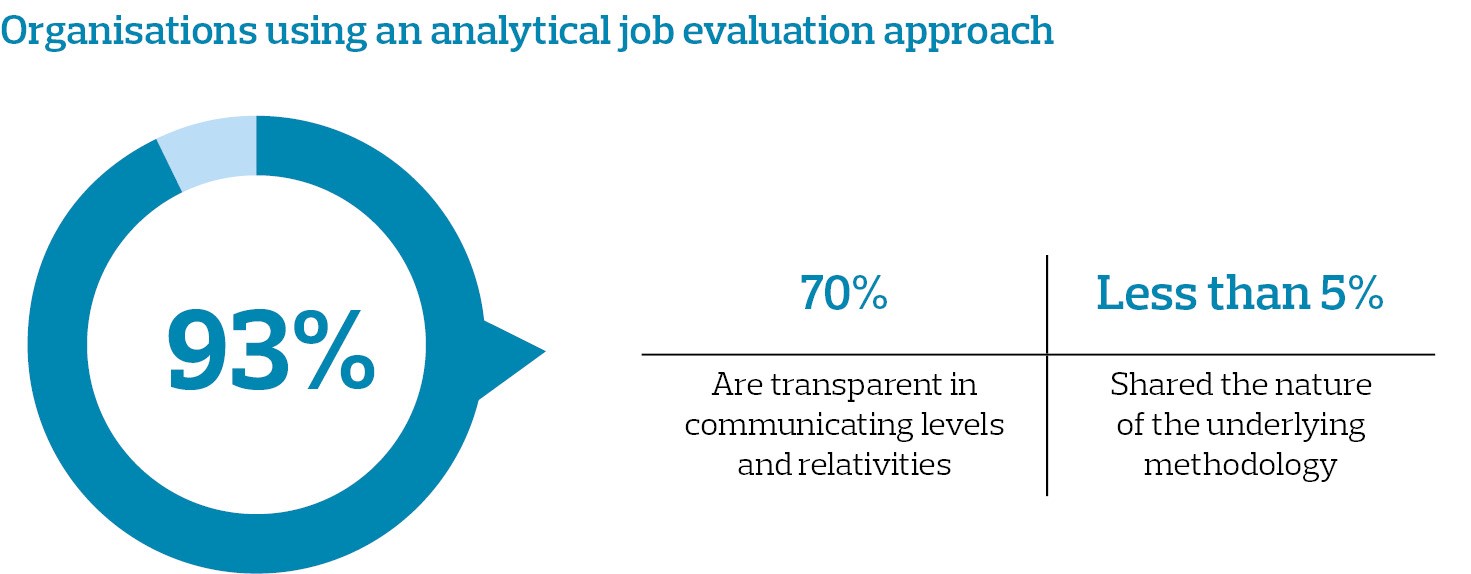
When speaking with participating leaders, many were clear on their firm’s intent to improve levels of transparency in the months ahead, but their main focus will remain on communicating outcomes and levels to keep the core job evaluation methodology in the background as an HR tool. Here are some of the comments we heard:
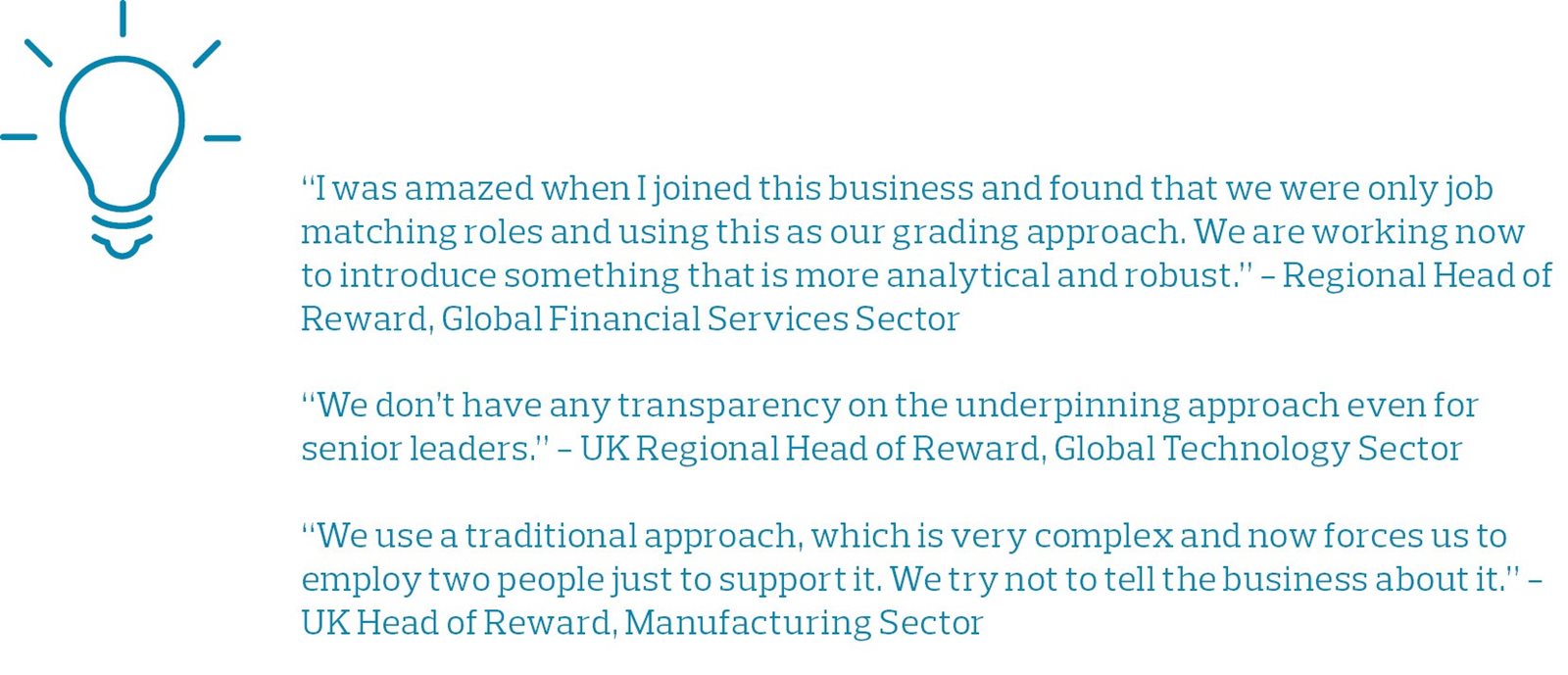
Arguments For and Against Analytical Job Evaluation
Whilst many organisations were quite happy with their grading approach, there were a number who spoke about its complexity and resulting challenges. Further feedback analysis showed that many of those with concerns were using more traditional market approaches, which they felt to be complex and an administrative burden. Of those in favour of job evaluation, the majority used simplified approaches (often of the same methodologies) or had developed their own supporting process.
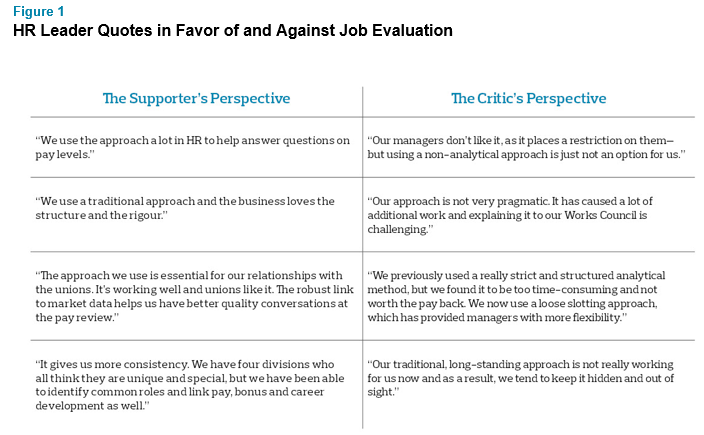
To dissect this further, our research asked for more detailed views on the strength or weaknesses of an analytical approach, encouraging respondents to offer thoughts on both sides of the argument. The results are summarised in the figure below.
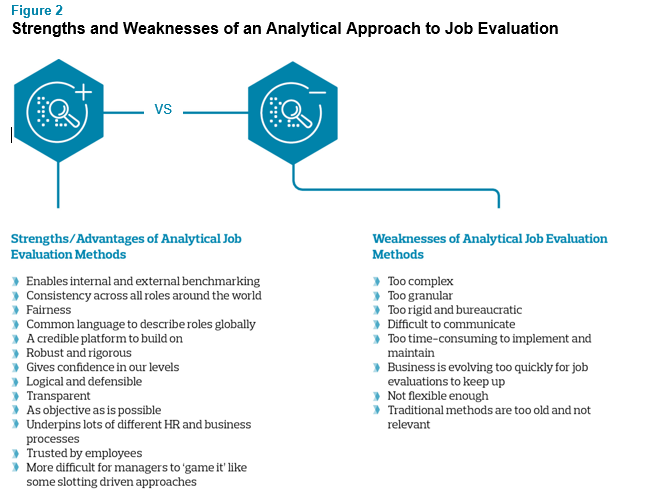
The arguments against job evaluation were highly consistent and focussed on the complexity and level of bureaucracy involved, making them difficult to communicate. This, in turn, could create a sense of rigidity in a world that now demands higher levels of flexibility and agility from organisations. While the arguments in favour of job evaluation were more varied, the common themes of consistency, rigour and perceived fairness were frequently raised, in addition to the connection to external market data and the defensibility that it created.
The Future of Analytical Job Evaluation Methods
The feedback was overwhelmingly supportive of analytical schemes. The alternatives were felt to lack rigour and consistency and were not seen as a credible alternative in the European market by nearly every respondent, even those few who were not currently using an analytical approach.
Yet, there is no doubt that job evaluation methods are under pressure to evolve and adapt — especially more traditional approaches, which are thought to be too rigid and complex. When asked about the developments they would like to see to help ensure value-add in the future, our rewards leaders’ responses were wide-ranging.
However, the most common concern was consistently focussed on the need for more agility and simplicity in the process. Additional concerns included:
- Jobs becoming harder to define and assess
- The need for more flexible and agile approaches to keep pace with business change and the evolution of roles
- A push towards more technology-led solutions
- Roles being increasingly shaped by job-holders personal attributes in the future
- The need for more dynamic and automated links to market data
It is true that analytical job evaluation schemes are not without issues, but the general sentiment was that the positives far outweigh the negatives. “We will always need a structure to inform decision making” was a common statement made by survey participants.
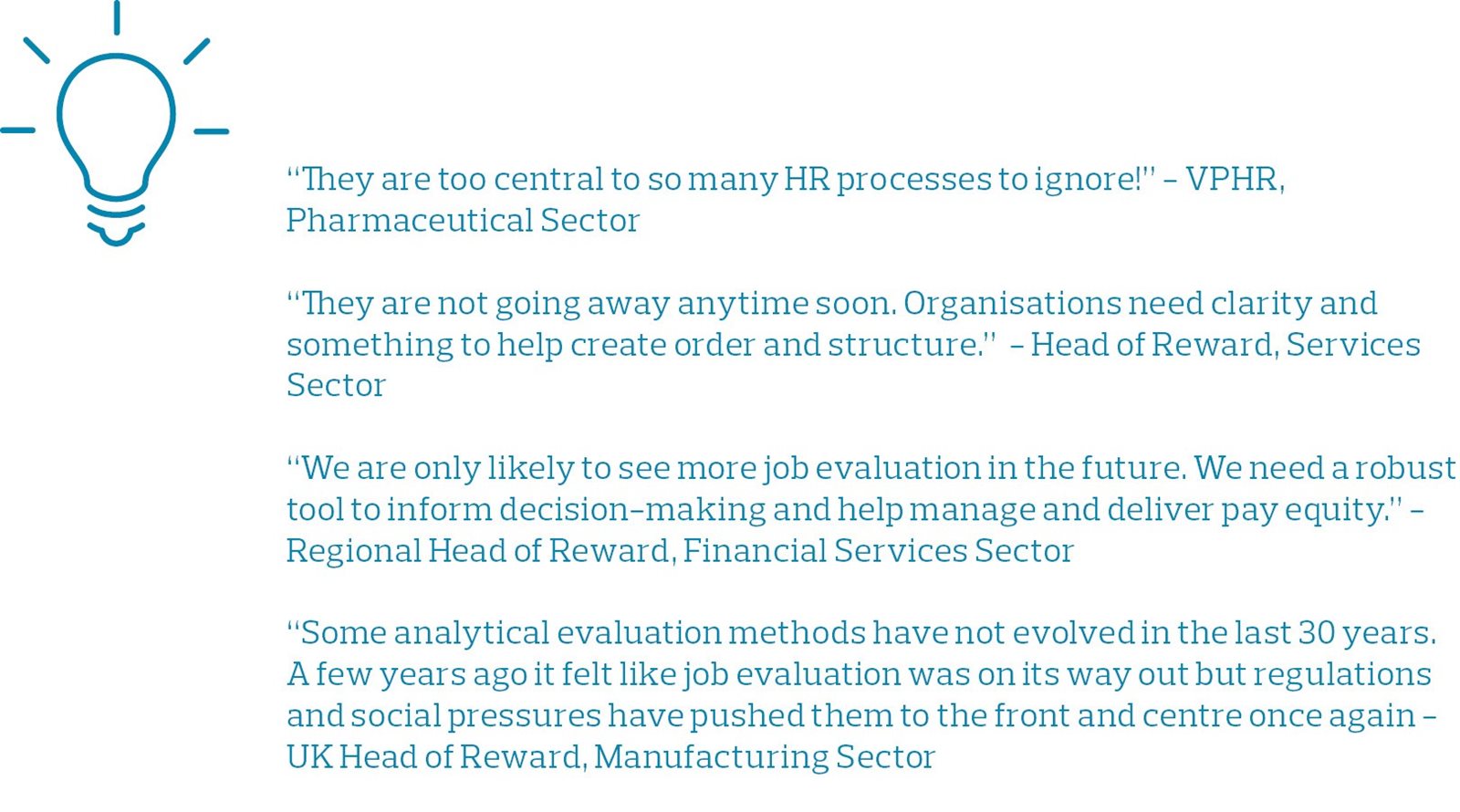
While their sheer necessity is clear, it is equally apparent that analytical job evaluation methods need to evolve. They must deliver more simplicity and greater levels of agility whilst retaining their current rigour and value-add — which is plainly non-negotiable. As organisations look to become more agile and flexible entities in these changing times, so should their job evaluation methodologies. The job evaluation gauntlet has been thrown down and it is now up to providers and methodologies to respond.
Next Steps
To learn more about how we help companies in their use of job evaluation and work with them to develop value-adding job architecture frameworks, please reach out to one of the authors or write to rewards-solutions@aon.com.
Related Articles